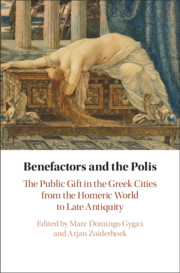66 results
Chapter 9 - Benefactors and the Poleis in the Roman Empire
- from Part IV - Benefactors and the Polis under Rome
-
-
- Book:
- Benefactors and the Polis
- Published online:
- 21 January 2021
- Print publication:
- 18 February 2021, pp 222-242
-
- Chapter
- Export citation
Abbreviations
-
- Book:
- Benefactors and the Polis
- Published online:
- 21 January 2021
- Print publication:
- 18 February 2021, pp xiv-xviii
-
- Chapter
- Export citation
Introduction
-
-
- Book:
- Benefactors and the Polis
- Published online:
- 21 January 2021
- Print publication:
- 18 February 2021, pp 1-12
-
- Chapter
- Export citation
Contents
-
- Book:
- Benefactors and the Polis
- Published online:
- 21 January 2021
- Print publication:
- 18 February 2021, pp v-vi
-
- Chapter
- Export citation
Part II - Classical Benefactors
-
- Book:
- Benefactors and the Polis
- Published online:
- 21 January 2021
- Print publication:
- 18 February 2021, pp 67-112
-
- Chapter
- Export citation
Copyright page
-
- Book:
- Benefactors and the Polis
- Published online:
- 21 January 2021
- Print publication:
- 18 February 2021, pp iv-iv
-
- Chapter
- Export citation
Index locorum
-
- Book:
- Benefactors and the Polis
- Published online:
- 21 January 2021
- Print publication:
- 18 February 2021, pp 347-360
-
- Chapter
- Export citation
Conclusion
-
-
- Book:
- Benefactors and the Polis
- Published online:
- 21 January 2021
- Print publication:
- 18 February 2021, pp 330-338
-
- Chapter
- Export citation
Index
-
- Book:
- Benefactors and the Polis
- Published online:
- 21 January 2021
- Print publication:
- 18 February 2021, pp 339-346
-
- Chapter
- Export citation
Part III - Hellenistic Benefactors
-
- Book:
- Benefactors and the Polis
- Published online:
- 21 January 2021
- Print publication:
- 18 February 2021, pp 113-198
-
- Chapter
- Export citation
Part I - Benefiting the Community in Early Greece
-
- Book:
- Benefactors and the Polis
- Published online:
- 21 January 2021
- Print publication:
- 18 February 2021, pp 13-66
-
- Chapter
- Export citation
Part IV - Benefactors and the Polis under Rome
-
- Book:
- Benefactors and the Polis
- Published online:
- 21 January 2021
- Print publication:
- 18 February 2021, pp 199-264
-
- Chapter
- Export citation
Tables
-
- Book:
- Benefactors and the Polis
- Published online:
- 21 January 2021
- Print publication:
- 18 February 2021, pp viii-viii
-
- Chapter
- Export citation
Figures
-
- Book:
- Benefactors and the Polis
- Published online:
- 21 January 2021
- Print publication:
- 18 February 2021, pp vii-vii
-
- Chapter
- Export citation
Acknowledgements
-
- Book:
- Benefactors and the Polis
- Published online:
- 21 January 2021
- Print publication:
- 18 February 2021, pp xii-xiii
-
- Chapter
- Export citation
Contributors
-
- Book:
- Benefactors and the Polis
- Published online:
- 21 January 2021
- Print publication:
- 18 February 2021, pp ix-xi
-
- Chapter
- Export citation
Part V - The Decline and Fall of Euergetism?
-
- Book:
- Benefactors and the Polis
- Published online:
- 21 January 2021
- Print publication:
- 18 February 2021, pp 265-329
-
- Chapter
- Export citation

Benefactors and the Polis
- The Public Gift in the Greek Cities from the Homeric World to Late Antiquity
-
- Published online:
- 21 January 2021
- Print publication:
- 18 February 2021
S. T. ROSELAAR (ED.), PROCESSES OF CULTURAL CHANGE AND INTEGRATION IN THE ROMAN WORLD (Mnemosyne Supplements. History and Archaeology of Classical Antiquity 382). Leiden/Boston: Brill, 2015. Pp. x + 314. isbn 9789004294547. £100.00/€115.00/US$149.00.
-
- Journal:
- The Journal of Roman Studies / Volume 107 / November 2017
- Published online by Cambridge University Press:
- 31 August 2017, pp. 359-361
- Print publication:
- November 2017
-
- Article
- Export citation
Glossary
-
- Book:
- The Ancient City
- Published online:
- 10 November 2016
- Print publication:
- 31 October 2016, pp xii-xiv
-
- Chapter
- Export citation



